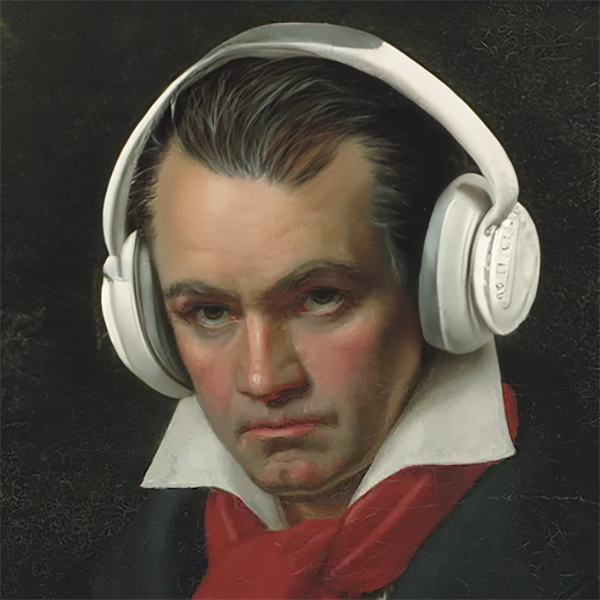Deaf but not unheard
Ludwig van Beethoven, one of the most celebrated composers in history, is equally famous for his extraordinary talent as well as the adversity he faced – most notably, his deafness. Many wonder how someone who lost the ability to hear could create such monumental works of art that still resonate today. In this comprehensive FAQ, we dive deep into the details of Beethoven’s hearing loss, how it affected his life, and most importantly, how he continued to compose despite his condition. Whether you’re a music enthusiast or simply curious about this fascinating aspect of Beethoven’s life, you’ll find all your questions answered here.
When Did Beethoven Go Deaf?
When did Beethoven go deaf?
Beethoven began to lose his hearing around 1798. To answer the question: “When did Beethoven lose his hearing”, we can say his deafness progressed gradually, and by 1814, he was completely deaf.
At what age did Beethoven lose his hearing?
Beethoven first noticed signs of hearing loss in his late 20s, around the age of 28. So, to answer the question “How old was Beethoven when he lost his hearing?”, it’s safe to say he was 28 years old when he started losing his hearing, and his condition progressively worsened. You might wonder: “How old was Beethoven when he went deaf?” Beethoven was 44 years old when he went completely deaf.
When did Beethoven go completely deaf?
What year did Beethoven go deaf? Beethoven went completely deaf in 1814, when he was 44 years old. By this time, he could no longer hear any external sounds. The precise answer of the question “At what age did Beethoven go deaf?” is: Beethoven became fully deaf at the age of 44.
When did Beethoven become deaf?
There is no exact date (in terms of date and time), but Beethoven’s hearing began deteriorating in his late 20s, and by 1814, he was completely deaf. To answer the question “How old was Beethoven when he became deaf?” He was 44.
How long was Beethoven deaf?
When did Beethoven start going deaf? It was around 1798. By 1814, he was completely deaf. So Beethoven was completely deaf for the last 13 years of his life, from 1814 until his death in 1827.
How and Why Did Beethoven Lose His Hearing?
How did Beethoven lose his hearing?
The exact cause of Beethoven’s hearing loss is not definitively known. However, many theories suggest it could have been due to lead poisoning, syphilis, typhus, or autoimmune disorders. Some speculate that he may have experienced nerve damage due to his intense exposure to loud sounds during his musical career.
Why did Beethoven lose his hearing?
Why was Beethoven deaf? While the precise reason remains unclear, possible causes include lead poisoning, diseases like typhus or syphilis, or a genetic predisposition to hearing loss. His lifestyle, including heavy alcohol consumption, may have also contributed.
What caused Beethoven to go deaf?
What made Beethoven deaf? As said above, there is no single agreed-upon cause. It is safe to say that his music is not the answer to the question “Why did Beethoven go deaf?” That being said, it’s safe to say you can smash those Keys Beethoven-style. No need to hold yourself back. 😉
How did Beethoven become deaf?
Beethoven became deaf gradually over time, which backs up the theory he lost his hearing due to a combination of illnesses and exposure to harmful substances. To answer the question “How did Beethoven go dead”, it’s safe to say it was a gradual loss of hearing as a result of an ongoing illness or poisoning.
How Did Beethoven Compose While Deaf?

How could Beethoven compose when he was deaf?
How did Beethoven compose while deaf? Well, Beethoven’s ability to compose music even after losing his hearing is one of the most remarkable aspects of his career. He relied on his deep understanding of music theory and his memory of how instruments and notes sounded. His imagination and mental auditory skills allowed him to “hear” the music in his mind as he wrote.
How did Beethoven hear his music?
Beethoven couldn’t physically hear his compositions after losing his hearing, but he “heard” the music internally. His extensive experience as a composer meant he could imagine how a piece would sound without hearing it externally. He likely also relied on vibrations from the piano and his acute sense of rhythm.
How could Beethoven compose music despite his loss of hearing?
Beethoven’s genius lay in his deep understanding of music. He could rely on his memory and ability to mentally hear music, using his vast experience to structure and compose pieces even when he could no longer hear them. So, to answer the question “How did Beethoven compose when he was deaf?”, it’s safe to say it was based on his familiarity with how instruments and musical patterns worked allowing him to construct compositions by visualizing the sounds in his mind.
How did Beethoven write music while deaf?
How did Beethoven make music while deaf? Well, Beethoven used his mind’s ear to “hear” the music and relied heavily on musical theory and form. He also adapted by feeling the vibrations of the piano, which gave him a sense of pitch and rhythm as he composed. Even after becoming completely deaf, Beethoven’s extraordinary musical knowledge and memory allowed him to compose without hearing the notes. He used vibrations and his understanding of musical textures and forms to continue writing masterpieces.
How did Beethoven overcome being deaf?
Beethoven overcame his deafness by relying on his mental ability to hear and feel music. His passion and dedication to composing, despite the isolation his hearing loss caused, allowed him to transcend this challenge and create some of his most famous works. However, he sadly never regained his hearing and went completely deaf in 1814, when he was 44 years old.
Beethoven’s Compositions While Deaf
Was Beethoven deaf when he wrote the 9th Symphony?
Yes, Beethoven was almost entirely deaf by the time he composed his famous 9th Symphony. Written between 1822 and 1824, he had been dealing with significant hearing loss for many years, but it didn’t stop him from composing one of his most iconic works, including the Ode to Joy.
Was Beethoven deaf when he wrote Für Elise?
No, Beethoven wasn’t completely deaf when he composed Für Elise. This piece was written in 1810, and while he had started losing his hearing by then, he wasn’t fully deaf yet. His hearing continued to deteriorate in the following years.
Was Beethoven deaf when he wrote the 5th Symphony?
Beethoven was already experiencing significant hearing loss when he composed his 5th Symphony between 1804 and 1808, but he wasn’t completely deaf at that time. The 5th Symphony is often viewed as a powerful expression of his struggle with his condition.
Was Beethoven deaf when he wrote Moonlight Sonata?
Beethoven was not yet fully deaf when he composed the Moonlight Sonata in 1801, though his hearing was already deteriorating. His increasing loss of hearing is often reflected in the more introspective and emotional tone of the sonata.
What did Beethoven compose while deaf?
Let’s sum it up: Beethoven composed several of his most famous works while he was either fully or partially deaf. These include his 9th Symphony, Missa Solemnis, Late String Quartets, Piano Sonata No. 29 (Hammerklavier), and many others. His later compositions, especially, were created after his hearing had almost entirely disappeared.
From Beethoven to Today: The Legacy Continues
Beethoven’s ability to compose masterpieces like the 9th Symphony and Moonlight Sonata despite profound deafness is a testament to his unparalleled genius and determination. His story continues to inspire musicians today, reminding us that great art often transcends the boundaries of physical limitations.
While we celebrate Beethoven’s timeless works, you can also explore contemporary interpretations of that same passion and energy. For a modern take that channels Beethoven’s spirit, check out Mythanien by Fred Vanterra. With its strong, vivid bassline and unmatched energy, this track is a nod to the intensity and depth of Beethoven’s compositions. You can listen to both Beethoven and Mythanien on Spotify below:
Thank you for exploring this extraordinary journey with us, and we hope Beethoven’s legacy continues to inspire your musical discoveries.

